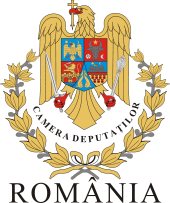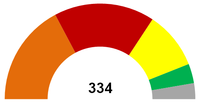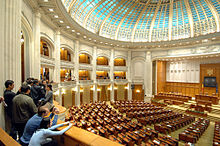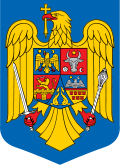- Chamber of Deputies of Romania
-
Chamber of Deputies
Camera Deputaţilor6th Legislature 
Type Type Lower house Leadership President Roberta Anastase, Democratic Liberal Party
since 19 December 2008Vicepresidents Ioan Oltean (PD-L)
Adrian Năstase (PSD+PC)
Daniela Popa (PSD+PC)
Ludovic Orban (PNL)
since December 2008/October 2009Secretaries Dumitru Pardău (PD-L)
Sever Voinescu (PD-L)
Valeriu Zgonea (PSD+PC)
Mihai Voicu (PNL)
since December 2008Quaestors Gheorghe Albu (PD-L)
Nicolae Bănicioiu (PSD+PC)
Dan Motreanu (PNL)
Hunor Kelemen (UDMR)
since December 2008Structure Members 334 
Political groups PD-L (115)
PSD + PC (110 + 3)
PNL (65)
UDMR (22)
National minorities (18)
independents (1)Committees 14- - Committee for Economic Policy, Reform, and Privatization;
– Committee for Budget, Finance, and, Banks, Committee for Industries and Services, Committee for Agriculture, Forestry, Food Industry and Specific Services;
– Committee for Human Rights, Cults and National Minorities Issues;
– Committee for Public Administration Territorial Planning and Ecological Balance;
– Committee for Labour and Social Protection, Committee for Health and Family;
– Committee for Education, Science, Youth, and Sport;
Committee for Culture, Arts, Mass Information Means;
– Committee for Legal Matters, Discipline, and Immunities;
– Committee for Defense Public Order, and National Security;
– Committee for Foreign Policy;
– Committee for the Investigation of Abuses, Corrupt Practices, and for Petitions;
– Committee for Standing Orders;
– Committee for information technologies and communications;
– Committee on Equal Opportunities for Women and Men
Elections Voting system 1992 – 2008: Closed list, D'Hondt method
since 2008: nominal vote, Mixed member proportional representationLast election 30 November 2008 Meeting place 
Palace of the Parliament, Bucharest Website www.cdep.ro The Chamber of Deputies (Romanian: Camera Deputaţilor) is the lower house in Romania's bicameral parliament. It has 315 seats, to which deputies are elected by direct popular vote on a proportional representation basis (Mixed member proportional representation starting 2008) to serve four-year terms. Additionally, the organisation of each national minority is entitled to a seat in the Chamber (under the limitation that a national minority is to be represented by one organisation only).
Contents
Presidents of the Chamber of Deputies
The Standing Bureau of the Chamber of Deputies consists of the President of the Chamber of Deputies, four vice-presidents, four secretaries, and four quaestors. The President of the Standing Bureau also serves as the President of the Chamber of Deputies. The President is elected, by secret ballot, for the duration of the legislative period. All the other members are elected at the beginning of each parliamentary session.[1]
Period Name Party 1990–1992 Dan Marţian FSN 1992–1996 Adrian Năstase FDSN 1996–2000 Ion Diaconescu PNŢCD 2000–2004 Valer Dorneanu PDSR 2004–2006 Adrian Năstase PSD 2006–2008 Bogdan Olteanu PNL 2008– Roberta Anastase PDL Leadership and structure
Standing Bureau
The (Romanian: Biroul Permanent) is the body elected by the deputies that rules the Chamber. Its President id the President of the Chamber, and s/he is elected for a whole legislature (usually four years). All the other members are elected at the beginning of each parliamentary session.
There is one President, and four of each: Vicepresidents, Quaestors and Secretaries. The current composition is listed bellow.
Function Name Group Incumbent since President Roberta Anastase PD-L December 2008 Vice-Presidents Ioan Oltean PD-L December 2008 Adrian Năstase PSD December 2008 Valeriu Zgonea PSD September 2010 Marian Sârbu Independents February 2011 Secretaries Dumitru Pardău PD-L December 2008 Niculae Mircovici Minorities February 2011 Georgian Pop PSD September 2010 Mihai Voicu PNL December 2008 Quaestors Gheorghe Albu PD-L December 2008 Nicolae Bănicioiu PSD+PC December 2008 Dan Motreanu PNL December 2008 Dénes Seres UDMR September 2009 Committees of the Chamber
Permanent commities and current leadership are listed bellow.
Committee President Group Incumbent since Committee for Economic Policy, Reform, and Privatization Mihai Tudose PSD Committee for Budget, Finance, and, Banks Maria Barna Indep 3 mai 2011 Committee for Industries and Services Iulian Iancu PSD Committee for Agriculture, Forestry, Food Industry and Specific Services Stelian Fuia PD-L 9 Sep. 2010 Committee for Human Rights, Cults and National Minorities Issues Nicolae Păun Minoritati Committee for Public Administration Territorial Planning and Ecological Balance Sulfina Barbu PD-L Committee for Labour and Social Protection Victor Paul Dobre PNL Committee for Health and Family Rodica Nassar PSD Committee for Education, Science, Youth, and Sport Cristian Dumitrescu PSD Committee for Culture, Arts, Mass Information Means Raluca Turcan PD-L Committee for Legal Matters, Discipline, and Immunities Buda Daniel PD-L Committee for Defense Public Order, and National Security Costică Canacheu PD-L Committee for Foreign Policy Attila Korodi UDMR 2 Feb. 2010 Committee for the Investigation of Abuses, Corrupt Practices, and for Petitions Ioan Stan PSD Committee for Standing Orders Iustin-Marinel Cionca-Arghir PD-L Committee for information technologies and communications Relu Fenechiu PNL Committee on Equal Opportunities for Women and Men Cristina Pocora PNL Committee for Romanians outside Romania William Brînză PD-L Committee for European Affairs Viorel Hrebenciuc PSD 2 mai 2011 Party composition
Romania 
This article is part of the series:
Politics and government of
RomaniaConstitutionJudiciary
2008–present
Main article: 2008 - present legislature of the Romanian ParliamentSeats in the Chamber of Deputies of Romania, 6th legislature Parliamentary Group Election seating Lost Won Present Seats % Seats % Democratic Liberal Party 115 34.43% 12 12 123 37.24% Social Democratic Party 114 34.13% 29 1 89 28.53% National Liberal Party 65 19.46% 16 6 61 16.22% Democratic Union of Hungarians in Romania 22 6.59% 1 0 21 6.61% Ethnic minorities parties 18 5.39% 1 0 17 5.41% Progresits — — 12 16 16 6.01% Deputies without a group 4 — Vacant seats 2 — Total 334 100 — 333 100 2004–2008
Main article: 2004 - 2008 legislature of the Romanian ParliamentIn Romania's 2004 legislative election, held on 28 November, no party won an outright majority. The Social Democratic Party (PSD) won the largest number of seats but is currently in opposition because the Justice and Truth Alliance, the Democratic Union of Hungarians in Romania, the Romanian Humanist Party(which later became the Conservative Party), and the National Minorities formed a governing coalition, giving it 177 seats in the Chamber of Deputies (47.9% of the total). The Conservative Party withdrew in December 2006, meaning that the government lost the majority in the Chamber of Deputies.[2] In April 2007 the liberal prime-minister, Călin Popescu-Tăriceanu, dismissed the Democratic Party ministers from the government and formed a minority government with the Democratic Union of Hungarians in Romania, marking the end of the Justice and Truth Alliance.[3]
During the 2004–2008 legislature, the president of the Chamber of Deputies was Bogdan Olteanu from the National Liberal Party, who was elected on 20 March 2006, after the Chamber's former president, Adrian Năstase, was forced by his own party (the Social Democratic Party, PSD) to step down amidst allegations of corruption.
After the 2004 elections, several deputies from the PSD switched to other parties (including the governing Justice and Truth Alliance) or became independents, with the total number of PSD seats being reduced from 113 to 105. The number of Justice and Truth Alliance deputies also increased from 112 to 118, making it the largest formation in parliament as of October 2006. This changed again in December 2006, leaving the PSD with 107 seats and the Justice and Truth Alliance with 101. Since April 2007 the Justice and Truth Alliance has split leaving the two former members with 51 respectively 50 members. Deputies elected to the European Parliament in the 2007 election resigned, thus reducing the number of deputies to 314 as of 4 December 2007.
A new election was held in 2008. The table below gives the state of play before the 2008 election; parties in bold were part of the governing coalition.[4] That coalition was tacitly supported by the PSD.[5]
Party % of seats Seats Social Democratic Party 32.31 105 Democratic Liberal Party 20.62 67 National Liberal Party 18.15 59 Greater Romania Party 6.77 22 Democratic Union of Hungarians in Romania 6.77 22 Conservative Party 5.85 19 National Minorities 5.54 18 Independents 4.00 13 Total 100 325 2000–2004
Elections to the Chamber of Deputies were held on 26 November 2000, in which the Social Democratic Party of Romania (PSD) won plurality. The governing majority was formed from the PSD and the Democratic Union of Hungarians in Romania (UDMR), which, with 182 members, made up 54.8% of seats. The president of the Chamber of Deputies during this period was Valer Dorneanu, who was elected on 15 December 2000. The distribution of seats was as follows:
Party % of seats Seats PSD 44.93 155 Greater Romania Party 24.35 84 Democratic Party 8.99 31 National Liberal Party 8.70 30 Democratic Union of Hungarians in Romania 7.83 27 National Minorities 5.22 18 Total 100 332 Notes
- ^ Regulamentul Camerei Deputaţilor
- ^ Guvern minoritar (Minority government), Evenimentul Zilei, 4 December 2006
- ^ "Romania's prime minister names new Cabinet of minority government", Associated Press (International Herald Tribune), 2 April 2007.
- ^ source
- ^ [1]
External links
Categories:- Politics of Romania
- National lower houses
- Government of Romania
- Parliament of Romania
- - Committee for Economic Policy, Reform, and Privatization;
Wikimedia Foundation. 2010.
